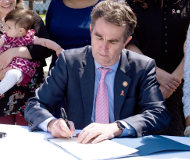3/28/2019
Virginia: Governor Northam Effectively Vetoes Speed CamerasSpeed camera bill sent back to the Virginia General Assembly with request for constitutionality study of its funding provision.

Virginia Governor Ralph Northam (D) on Tuesday applied the brakes to the freeway speed camera program that the General Assembly rushed through the legislative process without public input last month. Northam returned the legislation to the state Senate with an amendment that would require reconsideration of the entire camera program during the 2020 legislative session.
The state constitution gives the governor the power to sign, veto or propose amendments to legislation that arrives on his desk. If the House of Delegates and Senate pass the governor's recommended amendment, the amended bill becomes law immediately. Overriding an amendment requires the vote of a two-thirds majority in both chambers -- the same as if the bill had been vetoed.
"The provisions of the first and second enactments of this act shall not become effective unless reenacted by the 2020 session of the General Assembly," Northam's amendment states.
The sticking point for Northam is the unorthodox funding provision found in the original bill. State Senator Bill Carrico (R-Galax), who is retiring at the end of the session, specifically designed the automated ticketing program to raise money for the Virginia State Police. Carrico, a former state trooper, gave the state police all of the net profit generated by the speed cameras up to ten percent of the department's annual budget. After that, all remaining net profit would go to Virginia's school system.
Virginia's constitution requires the proceeds of "all fines collected for offenses committed against the Commonwealth" to go to the Literary Fund. This fund, which generates about $260 million annually, is used primarily to buy school equipment and pay teachers' retirement benefits. In 1990, law enforcement agencies that wanted to keep the proceeds from drug forfeitures had to obtain a specific constitutional amendment to bypass sending money to the schools.
Northam's amendment, if adopted, would require Virginia secretary of public safety Brian J. Moran to work with police organizations to consider the "constitutional implications of dedicating civil penalties to any fund other than the Literary Fund." Moran would have until November 1 to submit a report on the issue to the relevant House and Senate committee chairmen.
The speed camera program, as passed by the General Assembly, would have allowed the state police to set up automated speed traps in any highway work zone, regardless of whether any workers are actually present. A private, for-profit company would then mail $125 citations to the owners of vehicles passing through the zone at an alleged 12 MPH over the speed limit. The speed limits are often already reduced in such zones.
Article Excerpt:Governor's Recommendation to SB1521
1. After line 149, enrolled
insert
3. That the provisions of the first and second enactments of this act shall not become effective unless reenacted by the 2020 Session of the General Assembly.
4. The Secretary of Public Safety and Homeland Security, in consultation with the Virginia State Police, the Virginia Sheriffs' Association, and the Virginia Association of Chiefs of Police, shall review the proposed use of handheld photo speed monitoring devices and consider legal and constitutional implications of dedicating civil penalties to any fund other than the Literary Fund. The Secretary of Public Safety and Homeland Security shall report the results of such review to the Chairmen of the Senate Committee for Courts of Justice, the Senate Committee on Finance, the House Committee for Courts of Justice, and the House Committee on Appropriations by November 1, 2019.


